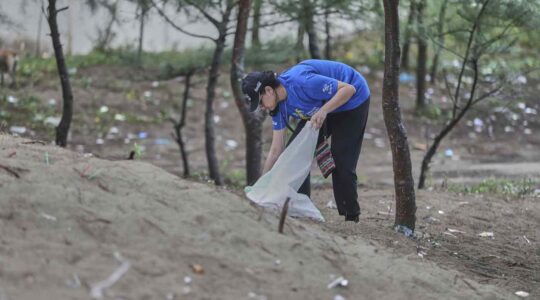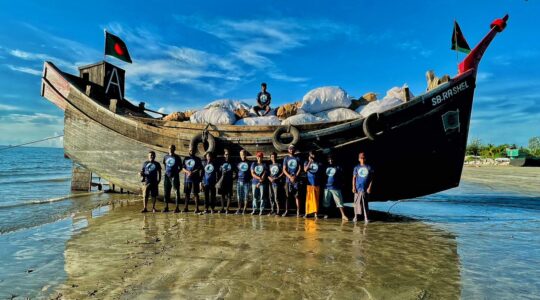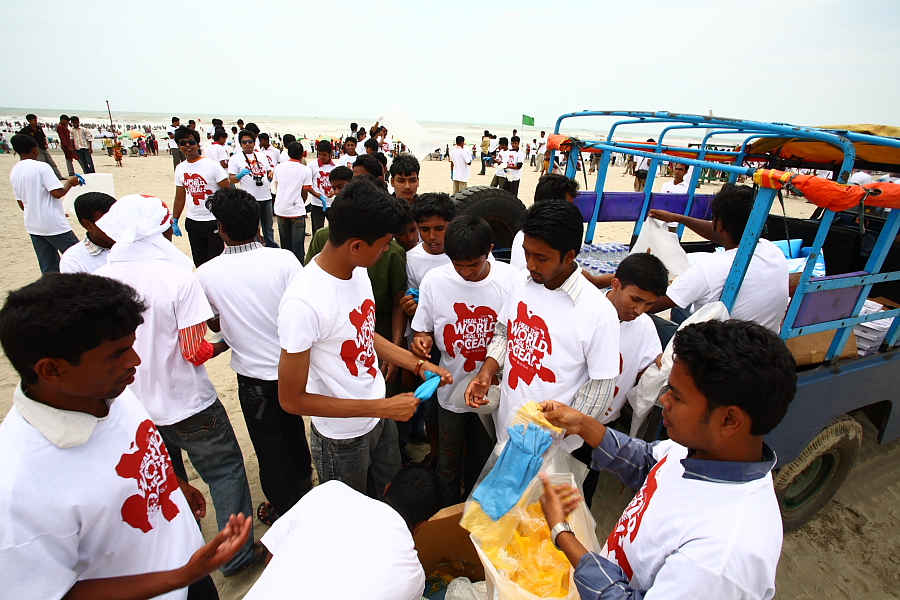
International Coastal Cleanup | 2009
CIGARETTE butts, poly bags don’t fall from sky, they fall from our hands. The elements that pollute our beaches are the things that we dump in the shorelines; these elements are the things we use regularly. Each year, Ocean Conservancy — in partnership with a network of volunteer organizations and individuals — provides a compelling global snapshot of marine and inland waterway debris all over the world. In this year’s Ocean Conservancy’s 23rd annual International Coastal Cleanup, nearly 400,000 volunteers will participate in 104 countries and locations. Locally represented by Kewkradong Bangladesh, this year’s initiative in our country will include over 400 volunteers from prominent universities, colleges and different organizations from Dhaka, Chittagong and Cox’s Bazaar.
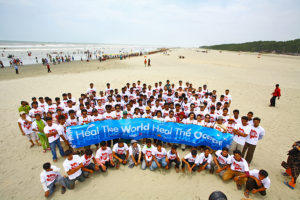 Kewkradong Bangladesh is organizing this day long programme since 2006 in Bangladesh with the help of local schools, government officials, hotel owners, sponsors, alliances, supporters and many other bodies who helped this noble venture to mark it as a success. The famous rock band ARTCELL will take part in this initiative to motivate youth to be a part of this global drive. Concito PR will be the PR partner for the whole event and AB Bank sponsoring the event.
Kewkradong Bangladesh is organizing this day long programme since 2006 in Bangladesh with the help of local schools, government officials, hotel owners, sponsors, alliances, supporters and many other bodies who helped this noble venture to mark it as a success. The famous rock band ARTCELL will take part in this initiative to motivate youth to be a part of this global drive. Concito PR will be the PR partner for the whole event and AB Bank sponsoring the event.
The overall statistics of the pollution and its elements are devastating. In addition to providing the Marine Debris Index — country-by-country data about the 6.8 million pounds of trash picked up — this statistics reveal the sources of debris: from cigarette butts and fast-food wrappers to syringes and old fishing lines. It also identifies the connection between the stress caused by marine debris and the ability of the ocean and its critical life support systems to adapt to the onset of global climate change.
Recommendations provide a roadmap for eliminating marine debris altogether by reducing it at the source, changing the behaviors that cause it, and supporting better policy. Humans have created the marine debris problem, and humans must take responsibility of it. The comprehensive body of data compiled during the cleanup in the course of its 23-year history continues to inform and inspire actions. Working together, citizens, environmentalists, our top corporations, and government leaders can take effective action to eliminate the scourge of trash in the ocean. The future of the planet and the well-being of present and future generations are counting on it.
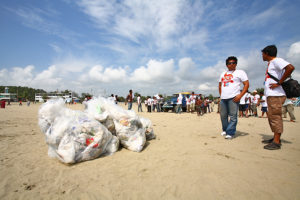 Litter can travel to the ocean from many miles inland, blown on the wind or carried along by rivers and streams. We are all responsible, from beachgoers to oil-rig workers and fishermen, for cigarette butts, food wrappers, bottles, and bags in the water. Overflowing sewage systems and storm drains add to the burden by ferrying trash from rural roads and city streets to the sea. And, despite national and international regulations against dumping, some people on boats still drop trash directly into the ocean. In recent years, organic materials that were once the most prevalent component of marine debris have been supplanted by synthetics. Not only do items like packing straps, tarps, nets, and containers last for years, but also they are often highly buoyant, traveling thousands of miles on ocean currents.
Litter can travel to the ocean from many miles inland, blown on the wind or carried along by rivers and streams. We are all responsible, from beachgoers to oil-rig workers and fishermen, for cigarette butts, food wrappers, bottles, and bags in the water. Overflowing sewage systems and storm drains add to the burden by ferrying trash from rural roads and city streets to the sea. And, despite national and international regulations against dumping, some people on boats still drop trash directly into the ocean. In recent years, organic materials that were once the most prevalent component of marine debris have been supplanted by synthetics. Not only do items like packing straps, tarps, nets, and containers last for years, but also they are often highly buoyant, traveling thousands of miles on ocean currents.
According to UNEP “Marine litter is one of the most pervasive and solvable pollution problems plaguing the world’s ocean and waterways.”
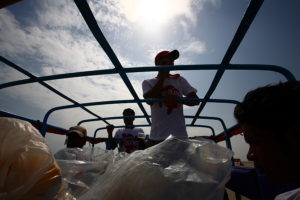 Of the 43 items tracked during the Cleanup, the top three items of trash found in 2008 were cigarette butts, plastic bags, and food wrappers/containers. All readily fall from human hands, and can be easily contained if people dispose them of carefully.
Of the 43 items tracked during the Cleanup, the top three items of trash found in 2008 were cigarette butts, plastic bags, and food wrappers/containers. All readily fall from human hands, and can be easily contained if people dispose them of carefully.
Marine debris kills. Every year, thousands of marine mammals, sea turtles, seabirds, and other animals are sickened, injured, or killed because of trash in the ocean. Animals choke or become poisoned when they eat trash, and drown when they become entangled in bags, ropes, and old fishing gear. The majority of entangled animals found during the Cleanup were bound up by old fishing line. The loss of wildlife affects not only the beauty and health of the planet, but also countless local economies based on the bounty of the sea.
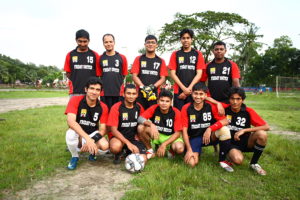 Marine debris degrades ocean health and compromises its ability to adapt to climate change. Marine debris is yet another stress on an ocean already facing transformation due to global climate change in the guise of rising sea levels, warming water, and changing ocean chemistry. As marine organisms and ecosystems struggle to adapt to climate change, we can improve their resilience and help to give them a fighting chance by eliminating the stresses caused by human impacts like trash in the ocean.
Marine debris degrades ocean health and compromises its ability to adapt to climate change. Marine debris is yet another stress on an ocean already facing transformation due to global climate change in the guise of rising sea levels, warming water, and changing ocean chemistry. As marine organisms and ecosystems struggle to adapt to climate change, we can improve their resilience and help to give them a fighting chance by eliminating the stresses caused by human impacts like trash in the ocean.
After gathering all of the data this is not hard to gain a more accurate originating source of all the trash polluting our ocean. These are very specific several sources which have been identified as how pollutant items enter the ocean and water bodies — worldwide. According to the data, it’s around 61% of total amount of collected debris are sourced by shoreline and recreational activities. In a country like us this indicator shows even higher like 64%.
Marine debris is a stress on an ocean already beleaguered by many other human-caused stresses including coastal development, pollution, overfishing, and now climate change. As the engine that drives our planet’s climate, the ocean is on the front lines of climate change. It absorbs half of the carbon dioxide (CO2) we pump into the sky from the burning of fossil fuels, respiratory systems of animals and most of the extra heat produced by the greenhouse effect. Indeed, the ocean is the unsung hero in this battle. But it’s also one of the most vulnerable victims.
The first ever cleanup was held in 1986 at Texas, USA. From then on, thousands of people participate voluntarily in this initiative. This year, volunteers will gather around the Cox’s Bazaar shores on August 14 to make people realize once again how important our beautiful beaches are to us. Maybe one day wouldn’t really make a difference in the overall situation, but it may well be a start to revolutionize our overall approach.


